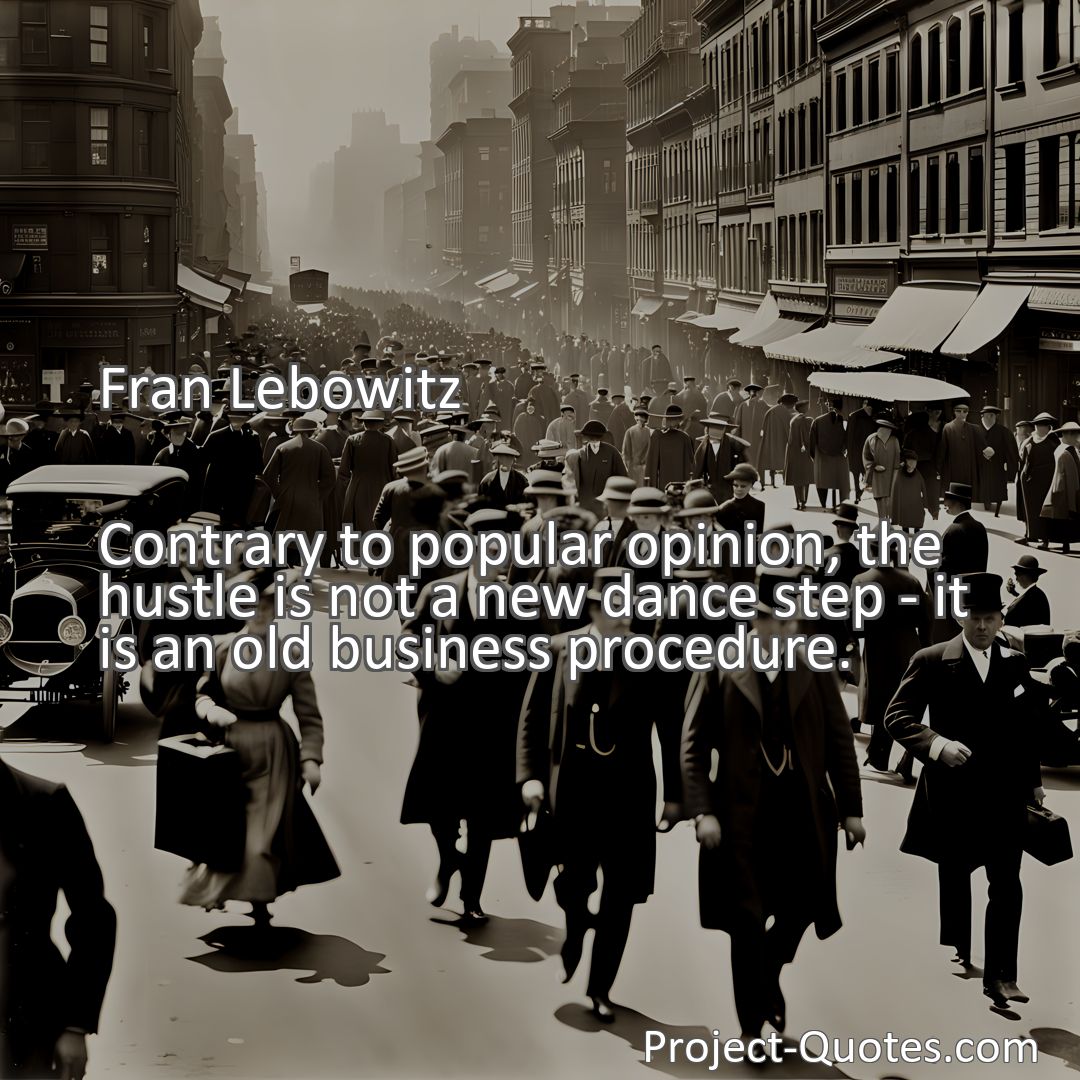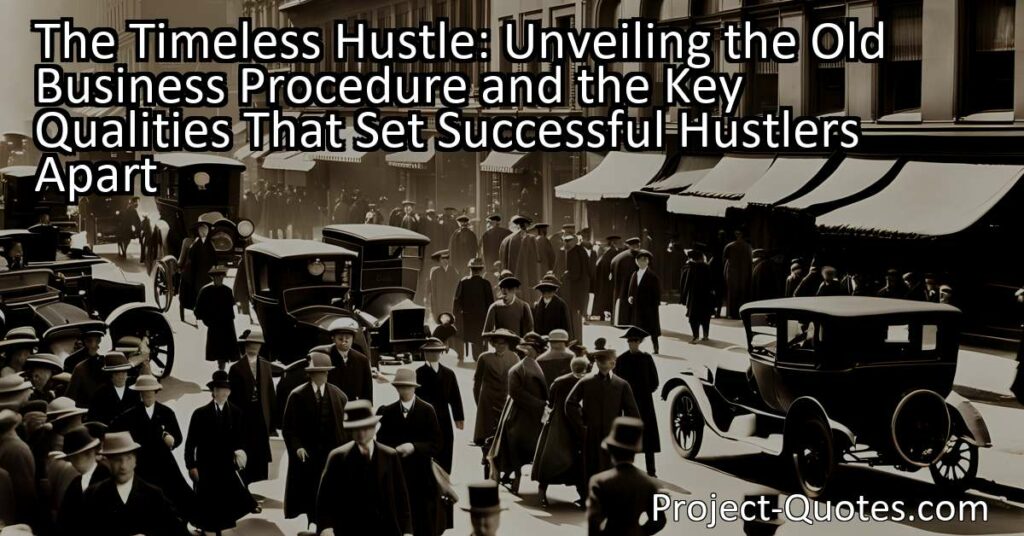Contrary to popular opinion, the hustle is not a new dance step – it is an old business procedure.
Fran Lebowitz
The Timeless Hustle: Unveiling the Old Business Procedure and the Key Qualities That Set Successful Hustlers Apart Discover the historical origins and evolution of the hustle, an age-old business procedure that has stood the test of time. From ancient Rome to the digital age, the hustle remains a valuable tool for success. Learn the key qualities that distinguish successful hustlers, such as passion, resilience, networking skills, and a growth mindset. Embrace the hustle mentality to overcome challenges, achieve personal and professional growth, and dance through life’s obstacles with determination and integrity.
Table of Contents
Meaning of Quote – Contrary to popular opinion, the hustle is not a new dance step – it is an old business procedure.
The Timeless Hustle: Unveiling the Old Business Procedure
Introduction
In today’s society, the word “hustle” is often associated with the energetic dance moves of popular culture. However, it is important to understand that the hustle is more than just a dance; it is an age-old business procedure. Fran Lebowitz, a renowned American author, once said, “Contrary to popular opinion, the hustle is not a new dance step it is an old business procedure.” In this article, we will delve into the history and significance of the hustle, exploring its roots, evolution, and enduring relevance. By understanding the hustle’s true nature, we can unlock its potential as a valuable tool for success.
1. The Historical Origins of Hustle
To grasp the true essence of the hustle, we must delve into its historical origins. The hustle is not unique to any specific period; it has existed since the beginning of human civilization. From the ancient bazaars of Rome to the bustling markets of the Middle Ages, people have always engaged in the hustle to survive and thrive. Whether it involved bartering, negotiation, or strategic partnerships, the concept of the hustle was ingrained in the fabric of human interaction.
2. The Evolution of the Hustle
As society progressed, so did the hustle. It underwent significant transformations, adapting to changing times and technologies. From the Industrial Revolution to the digital age, the hustle evolved alongside the advancements of civilization. The advent of globalization and the internet revolutionized how people conduct business. However, at its core, the hustle remains a tried-and-true method of achieving success. It may have taken on new forms, such as online entrepreneurship or side hustles, but the principles of negotiation, innovation, perseverance, and networking have remained constant.
3. The Hustle’s Relevance in the Modern World
In today’s fast-paced and competitive world, the hustle has become more crucial than ever. The digital era has opened up countless opportunities for aspiring entrepreneurs and professionals. However, with increased accessibility comes increased competition. To stand out in a sea of competitors, individuals must embrace their inner hustler. The hustle allows us to navigate through challenges, adapt to new situations, and seize opportunities. It cultivates a mindset of resilience, resourcefulness, and creativity that is vital for personal and professional growth.
4. Key Attributes of a Successful Hustler
While anyone can engage in the hustle, certain qualities set successful hustlers apart. Firstly, hustlers are driven by a relentless passion for their pursuits. Whether it be a small business owner passionate about their product or a freelancer dedicated to their craft, passion fuels the hustle. Secondly, hustlers possess a resilient nature, viewing failures as learning opportunities rather than setbacks. Thirdly, they understand the value of networking and building mutually beneficial relationships. Finally, successful hustlers have a growth mindset, constantly seeking knowledge and embracing new skills to stay ahead in their respective fields.
5. The Ethical Boundaries of the Hustle
In discussing the hustle, it is essential to address ethical considerations. While the hustle emphasizes resourcefulness and strategic thinking, it should not be synonymous with deceit or exploitation. A successful hustler values integrity and fairness, maintaining honesty and transparency throughout their pursuits. The hustle should never compromise one’s moral compass or harm others. Striking a balance between ambition and ethical conduct is crucial for sustainable success.
6. Embracing the Hustle: Applying it in Daily Life
Regardless of age or profession, incorporating the hustle mentality in daily life can lead to personal and professional growth. To embrace the hustle, individuals can start by setting clear goals, developing a strong work ethic, and seeking opportunities for self-improvement. Moreover, it is important to adopt a mindset that sees challenges as opportunities rather than obstacles. By remaining adaptable, proactive, and tenacious, individuals can overcome setbacks and emerge stronger. The hustle is not limited to the world of business but can also benefit students, career professionals, and even retirees seeking fulfillment and purpose.
Conclusion
Fran Lebowitz’s insightful quote reminds us that the hustle is more than just a dance; it is an age-old business procedure. The hustle’s historical origins, evolution, and relevance in the modern world demonstrate its enduring significance. By adopting the attributes of a successful hustler and embracing its principles, individuals can embark on a path of personal and professional success. However, it is essential to remember the ethical boundaries of the hustle, ensuring that ambition aligns with integrity. So let us embrace the hustle, tap into our inner resourcefulness, and dance through life’s challenges with passion, resilience, and determination.
I hope this quote inspired image brings you hope and peace. Share it with someone who needs it today!


